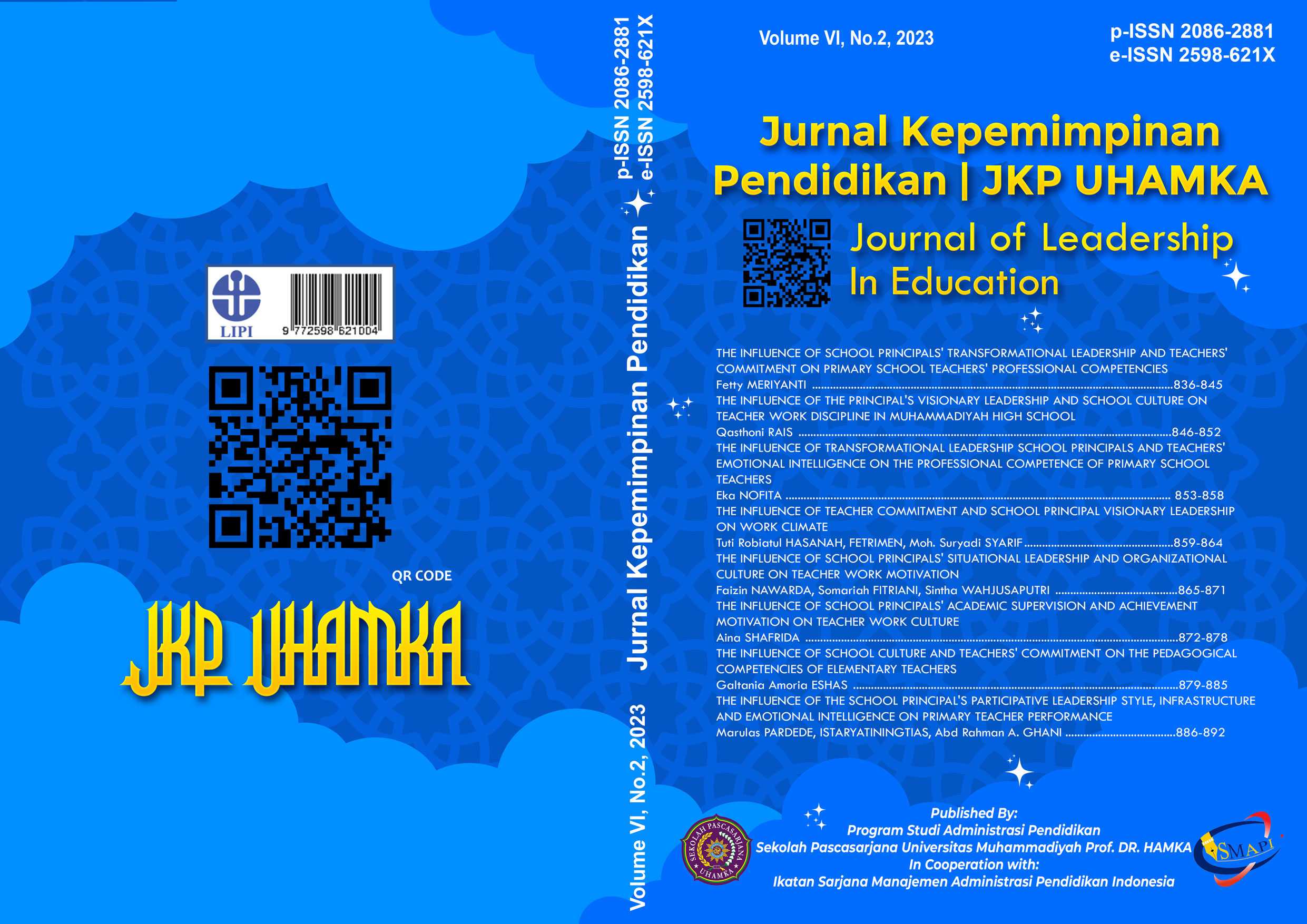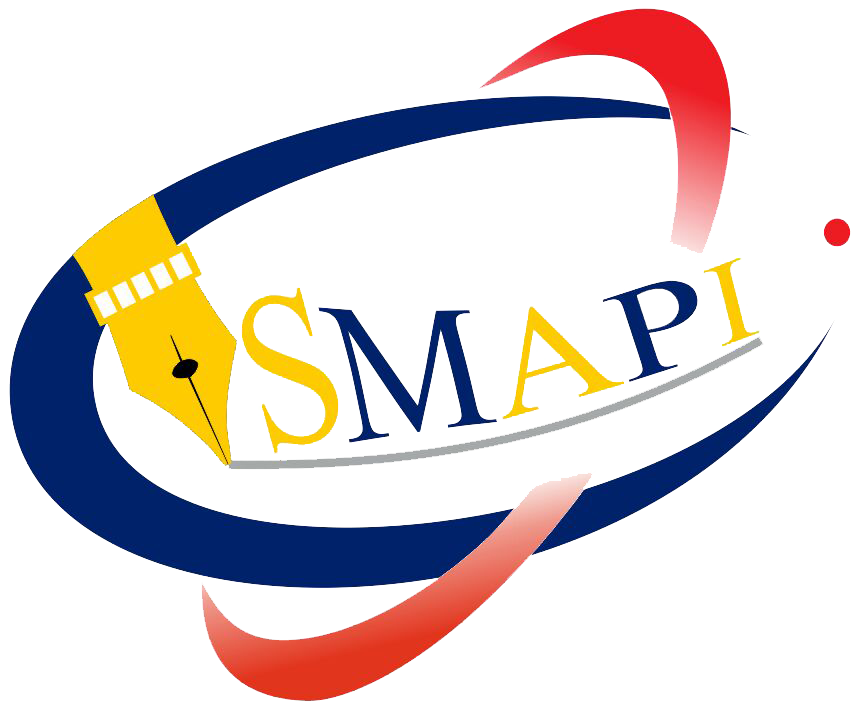THE INFLUENCE OF SCHOOL PRINCIPALS' TRANSFORMATIONAL LEADERSHIP AND TEACHERS' COMMITMENT ON PRIMARY SCHOOL TEACHERS' PROFESSIONAL COMPETENCIES
DOI:
https://doi.org/10.22236/jkpuhamka.v6i2.14509Keywords:
Principal Transformational Leadership, Teacher Commitment, Teacher Professional CompetenceAbstract
The purpose of this study is to investigate: The influence of the principal's transformational leadership on the commitment of teachers of Public Elementary Schools in Prohibition District, Tangerang City. The research approach used in this study is a quantitative approach. The population in this study was all teachers of State Elementary Schools in Prohibition District, Tangerang City with a sample of 211 teachers taken randomly (random sampling). The analysis technique used is the path analysis technique. Based on the analysis, it is known: 1) There is a direct positive and significant influence of Transformational Leadership of Principals on the Professional Competence of Public Elementary School Teachers in Prohibition Distric, Tangerang City. This is evident from the results of the calculated t value > t table (4,373 > 1,652) and the path coefficient value of 0.285. 2) There is a direct positive and significant influence Teacher commitment to the Professional Competence of State Elementary School Teachers in Prohibition District, Tangerang City. This is evident from the results of the calculated t value of the table t > (3,629 > 1,652) and the path coefficient value of 0.237. 3) There is a direct positive, and significant influence of the Principal's Transformational Leadership on the Commitment of Public Elementary School Teachers in Prohibition District, Tangerang City. This is evident from the results of the calculated t value > ttable (3,783 > 1,652) and the path coefficient value of 0.253.
Downloads
References
AlJufri, H., & Suprapto, C. H. (2014). Manajemen Sumber Daya Manusia Pendidikan. Jakarta: Smart Grafika.
Arokiasamy, A. R. A., Abdullah, A. G. K., @ Shaari, M. Z. A., & Ismail, A. (2016). Transformational Leadership of School Principals and Organizational Health of Primary School Teachers in Malaysia. Procedia - Social and Behavioral Sciences, 229, 151–157. https://doi.org/10.1016/j.sbspro.2016.07.124
Asad, N., Hashmi, H. B. A., Nasir, M., Khalid, A., & Ahmad, A. (2021). Transformational Leadership Relationship with Employee Creativity: The Moderating Effect of Knowledge Sharing and Mediating Effect of Creative Self-Efficacy. International Journal of Innovation, Creativity and Change, December, 1005–1029. https://doi.org/10.53333/ijicc2013/15913
Bass, B. M., & Bass Bernard, M. (1985). Leadership and performance beyond expectations.
Bass, B. M., & Bass, R. (2009). The Bass handbook of leadership: Theory, research, and managerial applications. Simon and Schuster.
Bass, B. M., & Stogdill, R. M. (1990). Bass & Stogdill’s handbook of leadership: Theory, research, and managerial applications. Simon and Schuster.
Bayram, S. (2021). World journal on educational technology: Current issues. World Journal on Educational Technology: Current Issues, 13(4), 261–271.
Chiang, T.-H., & Trezise, D. (2021). How teacher competence functions as an institutionalised discourse in the epoch of globalisation. Cambridge Journal of Education, 51(1), 105–125. https://doi.org/10.1080/0305764X.2020.1782352
Coladarci, T. (1992). Teachers’ sense of efficacy and commitment to teaching. The Journal of Experimental Education, 60(4), 323–337.
Colquitt, J., Lepine, J., & Wesson, M. (2019). Organizational behavior : improving performance and commitment in the workplace , 6e chapter by chapter changes.
Crow, L. D., & Crow, A. (1990). Educational psychology: New York. American Book Company.
Dee, J. R., Henkin, A. B., & Singleton, C. A. (2006). Organizational commitment of teachers in urban schools: Examining the effects of team structures. Urban Education, 41(6), 603–627.
Firestone, W. A., & Rosenblum, S. (1988). Building commitment in urban high schools. Educational Evaluation and Policy Analysis, 10(4), 285–299.
Herry, H., Lian, B., & Fitriani, Y. (2020). Pengaruh Kepemimpinan Kepala Sekolah dan Komitmen Guru terhadap Kinerja Profesional Guru. Jurnal Pendidikan Tambusai, 4(2), 1658–1666. https://doi.org/10.31004/jptam.v4i2.630
Ingersoll, R. M. (1997). Teacher professionalization and teacher commitment: A multilevel analysis.
Statistical analysis report. US Department of Education, Office of Educational Research and Improvement.
Kareem, J., Patrick, H. A., Prabakaran, N., Valarmathi, B., Tantia, V., Pramod Kumar, M. P. M., & Mukherjee, U. (2023). Transformational educational leaders inspire school educators’ commitment. Frontiers in Education, 8(May). https://doi.org/10.3389/feduc.2023.1171513
Karuppannan, G., & Jalani, S. (2021). The Relationship between Teacher Commitment and Effective Teaching Practices in Rural Primary School in Ranau, Malaysia. European Journal of Humanities and Social Sciences, 1(6), 32–38. https://doi.org/10.24018/ejsocial.2021.1.6.160
Kunter, M., Klusmann, U., Baumert, J., Richter, D., Voss, T., & Hachfeld, A. (2013). Professional competence of teachers: Effects on instructional quality and student development. Journal of Educational Psychology, 105(3), 805–820. https://doi.org/10.1037/a0032583
Moses, I., Admiraal, W., Berry, A., & Saab, N. (2019). Student-teachers’ commitment to teaching and intentions to enter the teaching profession in Tanzania. South African Journal of Education, 39(1), 1–15. https://doi.org/10.15700/saje.v39n1a1485
Orazbayeva, K. O. (2016). Professional competence of teachers in the age of globalization. International Journal of Environmental and Science Education, 11(9), 2659–2672. https://doi.org/10.12973/ijese.2016.714a
Razak, N. A., Darmawan, I. G. N., & Keeves, J. P. (2009). Teacher Commitment. International Handbook of Research on Teachers and Teaching, 343–360. https://doi.org/10.1007/978-0-387- 73317-3_22
Sarros, J. C., Cooper, B. K., & Santora, J. C. (2011). Leadership vision, organizational culture, and support for innovation in not‐for‐profit and for‐profit organizations. Leadership & Organization Development Journal, 32(3), 291–309.
Spencer, L. M., & Spencer, P. S. M. (2008). Competence at Work models for superior performance.
John Wiley & Sons.
Sudarwan, D. (2013). Profesionalisasi dan Etika Profesi Guru . Alfabeta.
Sugiyono. (2006). Sugiyono, Metode Penelitian Pendidikan Pendekatan Kuantitatif, Kualitatif dan R&D, Alfabeta : Bandung, 2006, hal. 3. Metode Penelitian Pendidikan Pendekatan Kuantitatif, Kualitatif Dan R&D, 22–29.
Sulastri, S., Fitria, H., & Martha, A. (2020). Kompetensi Profesional Guru dalam Meningkatkan Mutu Pendidikan. Journal of Education Research, 1(3), 258–264. https://doi.org/10.37985/jer.v1i3.30
Toprak, M., & Summak, M. S. (2014). Involvement in change and commitment to change: A study at public schools. International Journal of Social Sciences & Education, 4(4), 953–968.
Tyree Jr, A. K. (1996). Conceptualizing and measuring commitment to high school teaching. The Journal of Educational Research, 89(5), 295–304.
Uno, H. B. (2007). Teori motivasi & pengukurannya.
Zhu, C., Wang, D., Cai, Y., & Engels, N. (2013). What core competencies are related to teachers’ innovative teaching? Asia-Pacific Journal of Teacher Education, 41(1), 9–27. https://doi.org/10.1080/1359866X.2012.753984

Downloads
Published
How to Cite
Issue
Section
License
Copyright (c) 2024 Fetty MERIYANTI

This work is licensed under a Creative Commons Attribution 4.0 International License.














